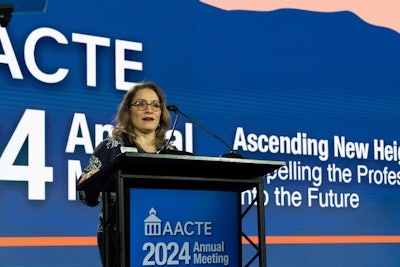Aurora, Colorado—
Educators who train and prepare students to become teachers gathered this weekend at the annual meeting of the American Association of Colleges of Teacher Education (AACTE) to call attention to the continuing challenges facing K-12 learning. Ta.
AACTE officials say this year's theme, “Rising to New Heights: Propelling the Profession into the Future,” is “all about advancing education and preparing educators through research, professional practice, advocacy, and education.” It is in line with the association's vision and mission to “revolutionize education for learners of all ages.” collaboration. ”
In her opening keynote address, Colorado Education Commissioner Susana Cordova said the challenge of teacher recruitment and retention remains an urgent concern in Colorado and nationally. Colorado State Education Commissioner Susana Cordova delivered the AACTE opening keynote speech.
Colorado State Education Commissioner Susana Cordova delivered the AACTE opening keynote speech.
“We are all working hard to fill the gaps that exist,” Cordova said, noting that increasing teacher vacancies, especially as a result of COVID-19, are a top priority for school districts across the country. added.
She reminded education professors and deans that the work they are doing at the higher education level is preparing future teachers and creating a future workforce that is prepared to meet the challenging needs facing education today. He said it helps by ensuring that requests are met. .
However, many educators who attended the annual meeting expressed concern about the political climate, which is making it more difficult to get college students to consider teaching careers. They point to a growing number of states, particularly Texas and Florida, that have passed laws that make it more difficult to teach about Black history, for example.
Political propaganda and ongoing culture wars are making life even more difficult for teachers trying to help students understand the importance of diversity and inclusion.
“I think we are still feeling the effects of the Brown decision,” said Leslie, AACTE’s resident dean, dean emeritus of the Howard University School of Education, and tenured professor of educational policy and leadership. Dr. Fenwick said.
She said the history of school vouchers and charters, which were then codified in state charters, is a persistent resistance to the historic 1954 U.S. Supreme Court case that desegregated public schools.
Fenwick appeared on a panel with other experts to discuss the future of American democracy.
Polarization in K-12 education is nothing new, said Dr. Sigal Ben-Porath, MRMJJ Chancellor's Professor in the Department of Policy, Organization, Leadership, and Systems at the University of Pennsylvania's Graduate School of Education. But the political climate goes beyond just curricular or ideological critiques, she added.
“Right now, we're polarized, not just about policy, but about each other,” she said. “This polarization is increasingly dividing us into two camps,” she continued, adding that this shift has created “distant policy and attitudinal positions with which we can find little common ground.” Ta.
As a result, the nation is witnessing what Ben Porras and Fenwick have called a “disappearing middle.”
“We see a chasm. It's a red-blue divide,” said Dr. Kevin Werner, director of the National Education Policy Center. He said it is difficult to legally protect teachers across the country.
“In many places, it's a really difficult job right now,” Werner said. “And the smart thing for people who want to keep their jobs is to keep their heads down.”
Werner said there is often a rift between educators and policy makers.
During the three-day meeting, education professors like Dr. Casey Johnson said they came to the annual meeting to network with other academics who train teachers. But she said she's also concerned about the lack of open educational resources, which would greatly benefit low-income students who can't afford expensive textbooks.
“Why are we creating more barriers for students?” asked Johnson, who is also dean of the School of Education at the University of Ottawa in Kansas. Johnson, a former teacher who spent his 24 years in K-12 education, said AACTE is an important professional organization.
“Cooperation and encouragement are key,” she said. “I’m not interested in reinventing the wheel.”


